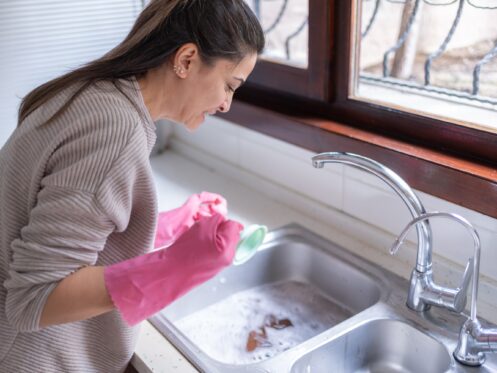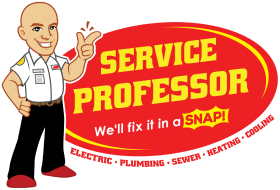In today’s world of DIY culture, it’s tempting to fix everything yourself. With a quick YouTube tutorial and a few tools, it may seem like you can handle household repairs, including your HVAC system, plumbing, or electrical issues. However, these systems are complex, and attempting to fix them without the proper knowledge and training can lead to costly mistakes, safety hazards, and long-term damage.
Let the licensed and certified HVAC, plumbing, and electrical team at Service Professor help you fix your home services needs safely and to code to avoid further problems or other unfortunate consequences.
Here’s why you should leave these jobs to our professionals:
1. Safety First
Each of these systems involves serious risks:
- HVAC systems contain refrigerants that require special handling, and improper repairs can lead to gas leaks or system failures.
- Plumbing work often involves high water pressure, hot water, or even exposure to toxic sewage if not handled correctly.
- Electrical repairs pose the risk of electrocution, fires, and other hazards if wires are incorrectly installed.
Professional technicians are trained to follow safety codes and ensure that your home remains hazard-free.
2. DIY Can Make the Problem Worse
While DIY repairs might seem like a cost-effective solution, one small mistake can turn a minor issue into a major disaster.
- A leaking pipe may seem easy to patch, but incorrect sealing can lead to flooding.
- Incorrect wiring can fry an entire electrical panel or even start a fire.
- HVAC mishandling can damage compressors, leading to expensive replacements.
What starts as a quick fix could result in thousands of dollars in damage.
3. You Could Void Your Warranty
Many home systems come with warranties that require professional servicing. If you attempt to fix your HVAC, plumbing, or electrical systems on your own and something goes wrong, the manufacturer or service provider may void your warranty, leaving you responsible for the full repair costs.
4. Legal and Code Compliance Issues
HVAC, plumbing, and electrical work are governed by strict building codes and regulations. DIY repairs might not meet local codes, leading to problems when selling your home or even fines from inspectors. Licensed professionals ensure all work is up to Michigan code and properly documented.
5. Professionals Have the Right Tools and Expertise
Even if you have a well-stocked toolbox, most home repair jobs require specialized tools that professionals are trained to use.
- Electricians use voltage meters and circuit testers to diagnose issues accurately.
- Plumbers rely on pipe wrenches, augers, and thermal imaging to find leaks.
- HVAC technicians use refrigerant gauges and advanced diagnostic equipment.
These tools, combined with years of training, allow professionals to complete the job quickly and effectively.
6. Peace of Mind and Long-Term Savings
Hiring a professional from Service Professor means the job is done right the first time. While a DIY attempt might seem cheaper at first, mistakes can lead to costly re-repairs, emergency fixes, and even property damage. Investing in expert services ensures long-term efficiency, reliability, and safety.
Your home’s HVAC, plumbing, and electrical systems are vital to your comfort and safety.
While DIY projects can be fun and rewarding in certain areas, these critical systems require professional attention. By calling in an expert, you ensure that your home remains safe, efficient, and problem-free.
How do you know if you need a professional?
Rule of thumb- When in doubt, always call a licensed professional! Knowing when to call a licensed contractor can save you time, money, and potential safety risks. While minor tasks like changing an air filter or tightening a faucet may be manageable, more complex issues require a professional.
When to Call a HVAC Professional
Your heating, ventilation, and air conditioning (HVAC) system keeps your home comfortable year-round in the ever-changing West Michigan climate. If you experience any of these issues, it’s time to call a licensed HVAC technician:
- No Heating or Cooling:If your furnace or AC stops working completely, a professional can diagnose and repair the issue safely.
- Unusual Noises or Smells: Rattling, banging, or musty/moldy smells may indicate serious problems.
- Weak or Inconsistent Airflow: This could be a sign of clogged ducts, a failing blower motor, or compressor issues.
- Refrigerant Leaks: HVAC systems use refrigerants that require proper handling and disposal.
- Frozen or Leaking AC Coils: Attempting to fix this without training can lead to costly damage.
- Frequent Cycling or High Energy Bills: If your system turns on and off frequently or your energy bills spike, an HVAC technician can help improve efficiency.
Regular HVAC maintenance (at least once or twice a year) by a professional can prevent major issues and extend the life of your system.
When to Call a Licensed Plumber
Water damage can be one of the most expensive home repairs. The licensed plumbers at Service Professor are trained and equipped to help solve your plumbing woes. Here’s when to call a plumber instead of DIY-ing:
If you suspect a leak but can’t locate it, professional plumbers use leak detection tools like thermal imaging and pressure tests to find hidden problems.
When to Call a Licensed Electrician
Electrical work is one of the most dangerous DIY projects. Call a Service Professor electrician if you experience any of the following:
- Frequent Circuit Breaker Trips: This indicates overloaded circuits or faulty wiring.
- Burning Smell or Scorched Outlets: This is a serious fire hazard that requires immediate attention.
- Flickering or Dimming Lights: This may be caused by loose connections or faulty wiring.
- Buzzing or Crackling Sounds from Outlets/Switches: This could signal dangerous electrical arcing.
- Installation of New Outlets, Light Fixtures, or Appliances: DIY mistakes in electrical work can lead to code violations or even electrical fires.
- Electric Shocks When Touching Switches or Appliances: This is a sign of improper grounding or faulty wiring.
Never attempt electrical repairs without the right knowledge and safety precautions. It’s always best to hire a professional to avoid electrocution or fire hazards.
Dangers of Self-Repairing HVAC, Plumbing, Sewer/Drain, and Electrical Systems
DIY projects can be fun and cost-effective, but when it comes to your home’s critical systems—HVAC, plumbing, sewer/drain, and electrical—attempting repairs yourself can lead to costly damage, health risks, and even life-threatening situations. Here’s why you should always leave these repairs to the professionals.
Dangers of DIY HVAC Repairs
Your heating, ventilation, and air conditioning (HVAC) system is a complex network of electrical components, refrigerants, and mechanical parts. A single mistake can cause major system failures or safety hazards.
Risks of DIY HVAC Repair:
- Refrigerant Handling Hazards – HVAC systems use refrigerants (like Freon), which can be harmful if improperly handled. A leak can cause respiratory issues, poisoning, and environmental damage.
- Electrical Shock or Fire – HVAC systems require high-voltage wiring. If you miswire or improperly connect components, you risk electrical shock or a house fire.
- Carbon Monoxide Poisoning – Gas-powered furnaces and water heaters can leak carbon monoxide (CO), an odorless, deadly gas, if improperly repaired.
- Compressor Damage – Misdiagnosing an issue and overloading the system can permanently damage the compressor, one of the most expensive parts to replace.
- Voiding Your Warranty – Most HVAC manufacturers require certified technicians to perform repairs, or else your warranty becomes void.
- Burst Pipes & Water Damage – Over tightening or incorrectly sealing pipes can lead to leaks or burst pipes, flooding your home and damaging walls and floors.
- Sewage Backups – Improper drain repairs can cause sewage to back up into your home, exposing you to bacteria and hazardous waste.
- Cross-Contamination – Mistakes in plumbing work can allow dirty water to mix with your clean water supply, leading to health risks.
- Hidden Leaks & Mold Growth – Even a slow drip behind a wall can cause structural damage and toxic mold infestations.
- Increased Water Bills – A small leak you thought you fixed could waste thousands of gallons of water per year.
- Damage to Pipes – Overusing chemical drain cleaners can corrode pipes, leading to leaks and costly replacements.
- Sewage Exposure – Sewer backups can contain harmful bacteria, parasites, and viruses that cause severe health problems.
- Tree Root Damage – If roots have invaded your sewer line, a DIY fix won’t be enough—only a professional with specialized equipment can properly remove them.
- Pipe Misalignment or Collapse – Digging around sewer lines without the right tools can cause pipes to break, leading to expensive excavation work.
- Improper Drain Snaking – Using a plumbing snake incorrectly can break pipes or push clogs further down, making the problem worse.
- Electrocution – Touching live wires without proper training can result in severe injury or death.
- House Fires – Faulty wiring is a leading cause of house fires. Improper connections or overloading circuits can create a fire hazard.
- Code Violations & Insurance Issues – DIY electrical work may not meet local building codes, which can lead to fines or void your home insurance policy.
- Improper Grounding – Incorrect wiring can cause electric shocks when touching appliances or outlets.
- Overloaded Circuits – Incorrectly installed outlets or circuits can lead to overheating and fires.
- High repair costs due to mistakes
- Safety hazards, including fire, floods, and toxic exposure
- Code violations and voided warranties
- Long-term property damage
Dangers of DIY Plumbing Repairs
Plumbing systems seem simple, but one small error can cause major water damage, mold growth, and expensive repairs.
Risks of DIY Plumbing Repair:
Dangers of DIY Sewer & Drain Repairs
Clogged drains and sewer lines might seem easy to fix, but using the wrong methods can make problems worse and create hazardous situations.
Risks of DIY Sewer & Drain Repair:
Dangers of DIY Electrical Repairs
Electrical repairs are one of the most dangerous home repair tasks. Even minor mistakes can lead to fires, electrocution, or serious property damage.
Risks of DIY Electrical Repair:
Final Thoughts: Call a Professional for Safety & Peace of Mind
Your home’s HVAC, plumbing, sewer/drain, and electrical systems are not areas where DIY is worth the risk. Attempting to fix these problems yourself can lead to:
Instead of risking your home and health, hire a licensed expert from Service Professor who can fix the issue correctly the first time. It’s an investment in safety, efficiency, and long-term savings.

